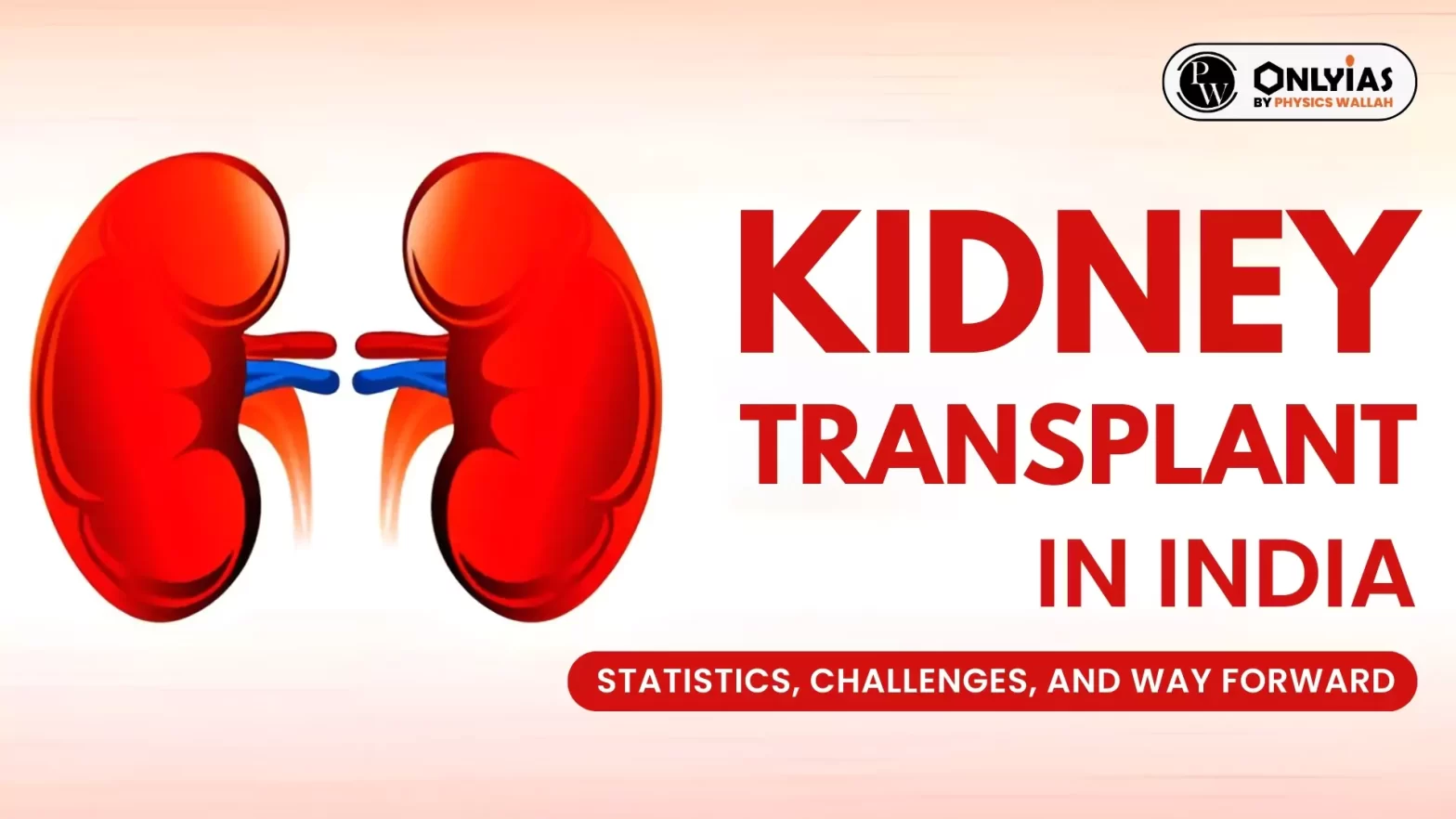Context
This editorial is based on the news “Reform can address India’s kidney transplant deficit” which was published in the Hindu. This article highlights the severe kidney shortage in India and also explains that innovative methods of kidney swaps and kidney chains could increase transplants and suggests India should adapt successful international practices to help its citizens and reduce illegal kidney sales.
Kidney Transplant in India: Statistics
- Alarming Situation: India’s organ shortage for kidneys is alarming.
- In 2022, over two lakh patients needed a kidney transplant, but there were only about 7,500 transplants (about 3.4%).
- Prevalence of CKD: Due to the prevalence of diabetes, malnourishment, overcrowding and poor sanitation, there is a high prevalence of Chronic Kidney Disease (CKD) in India, affecting about 17% of the population.
- ESRD: CKD often leads to end-stage renal disease (ESRD) and a kidney transplant is often the best treatment.
- Lack of Facilities: In contrast to India, the United States and other developed countries could carry out about 20% transplants. Notably, a significant portion of this gap is on account of more stringent regulations in India than a lack of medical facilities.
Kidney Transplant in India
- Need: Transplant is often better than alternatives on almost all dimensions that matter: quality of life, patient convenience, life expectancy, as well as cost-effectiveness.
- Way to Obtain: These are four main ways a patient can obtain a kidney.
- From a deceased person.
- Challenge: This is constrained due to a lack of donations, the particular conditions required on the nature of death, and the infrastructure needed to collect and store kidneys.
- Request a relative or friend to donate.
- Challenge: Donor and recipient have to be compatible in terms of blood type and tissue type; such relative/friend donors are often incompatible.
- Kidney Swap: It is done when two incompatible donor-recipient pairs exchange kidneys.
- For Example: Sunita and Zoya, incompatible with their respective spouses, can swap donors if compatibility is found, allowing transplants to occur.
- Kidney Chain: It starts with an altruistic donor. This donor gives a kidney to a compatible recipient, whose incompatible donor gives to another compatible recipient, creating a chain of donations.
- For Example: Sonu is an altruistic donor donating his kidney with no expectation of a kidney in return. Sonu donates to Sunita (assuming compatibility), Sunita’s spouse donates to Zoya, and Zoya’s spouse donates to some other and so on.
- Kidney ‘swaps’ and kidney ‘chains’ are two innovative kidney exchange methods.
Challenges Associated With Kidney Transplant in India
-
Less Use of Technologies:
- Very less swap transplants and almost no chain transplants in India because of legal roadblocks.
-
Differences in Rules for Swap Transplants:
- Swap transplants are legally allowed in India with due permission, but only near-relatives are allowed as donor-recipient pairs.
- While Kerala, Punjab and Haryana are exceptions by allowing non-near-relative donor-recipient pairs after verification.
-
Almost no Kidney Chains:
- In all States except Kerala, it is illegal to donate a kidney out of altruism.
- Kidneys from the deceased or brain dead are not used for chains or cycles.
- The lack of kidney chains is possibly an even bigger opportunity missed than swaps as chains involve significantly lower hospital resources and uncertainty for participants.
-
Lack of a Coordinating Authority:
- Unlike national, regional and State lists for direct transplant from cadavers, there is no national coordinating authority for swaps.
- This is also a huge lost opportunity, since larger and more diverse pools make it easier to find compatible swaps.
-
Proliferation of Black Markets:
-
- Harsh laws regulating swaps and chains have contributed to a proliferation of black markets for kidneys. These black markets endanger all, since these operations are conducted without due legal and medical safeguards.
- ‘Selling a kidney’ to relieve financial distress is a mainstream reference.
-
- Reforms of kidney exchange laws have been slow.
- The Transplantation of Human Organs and Tissues Act 1994: It began the recognition of transplant possibility from brain-stem death.
- Amendment of 2011: In 2011, swap transplants were legalised, and a national organ transplant programme was initiated.
- But the national network remained underdeveloped initially.
- Missing out Fundamental issue of Inadequate Kidney Supply: The government’s recent reforms i.e., the New National Organ Transplantation Guidelines (February 2023) allow more flexibility in age and domicile requirements while registering to obtain an organ.
- But these reforms leave the fundamental issue of inadequate kidney supply largely unaddressed.
Way Forward to Kidney Transplant in India
- Need for Kidney Regulations: Regulations for kidney exchange are needed as kidney exchange must often occur across family members.
- Need Innovative Reforms: These regulations need urgent reforms to liberate innovative kidney exchange methods- kidney ‘swaps’ and kidney ‘chains’.
- Encouragement for Altruistic Donation: Need to allow and encourage altruistic donation, non-near relative donation for swaps, and to improve the kidney-exchange infrastructure.
- Learn from Others: India needs to learn from others and implement such regulations to overcome organ shortage for kidneys.
- Allow Altruistic Donations: Like Australia, Canada, Israel, the Netherlands and the U.S.
- Maintain National-Level Registries for Kidney Chains and Swaps: Like Spain and the United Kingdom.
- The U.S. has especially made progress in facilitating thousands of swaps and chains.
- Reach out for international collaborations for kidney exchange like Spain.
- Easing the Laws: For swaps, laws need to be eased.
Conclusion
The unveiled kidney transplant crisis in India demands urgent attention and comprehensive reforms. By learning from international practices, implementing regulatory changes, and fostering collaborations, India can bridge the gap in organ transplantation.
Also Read: Global TB Report 2023 By World Health Organization (WHO)

